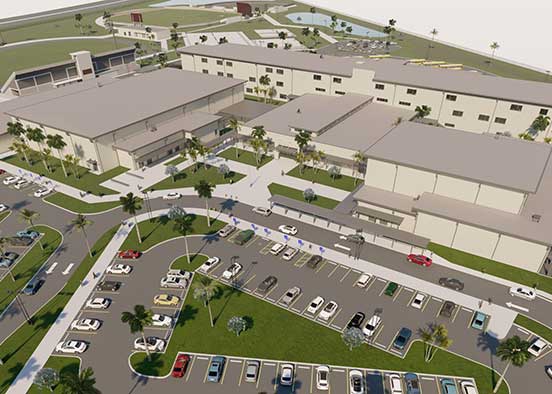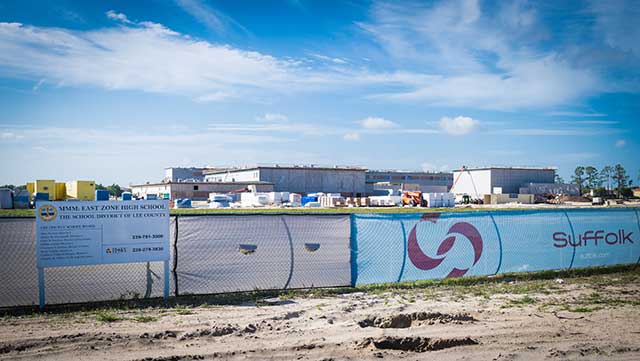
Even before the COVID-19 pandemic showed many of us new ways to apply digital technology to our work, industries already were reshaping themselves in a virtual world.
That’s why when Florida Gulf Coast University introduced a construction management degree program in the U.A. Whitaker College of Engineering about a year ago, it was critical that the curriculum included immersion in the latest technology that helps guide a building industry that has progressed far beyond just blueprints, beams and brick.
And when the construction industry itself jumps aboard to help the degree program progress right along with it – as construction company Suffolk has done with the donation to FGCU of the Building Information Models (BIMs) for the new Gateway High School contracted by the Lee County School District – you have the foundation for a business-higher education partnership that benefits the university’s construction managers of tomorrow in ways that traditional learning tools just can’t.
“This generous gift from Suffolk will allow us to reinforce one of the key threads of learning in our B.S. in construction management – that of staying current in the new construction technologies and bringing them to the classroom,” said Craig Capano, founding program chair and professor. “This technology will help our students and faculty visualize and manipulate data for a real-world project. What a great living-learning virtual lab we will be able to create.”

Capano explains that these digital models will be used in coursework as well as for research and visualizations in the Virtual Immersive Portal for Engineering Research (VIPER) Lab, located on the fourth floor of Holmes Hall. “The models are based on a new technology platform (BIM 360) that is revolutionizing the AEC (architecture, engineering and construction) industry,” Capano said. “These digital models of the new high school will enable our students to extract information for estimating, scheduling, construction engineering and a host of other related learning experiences.”
BIM 360 is described as a unified platform that connects project teams and data in real-time from design through construction. “It’s the next evolution in document exchange for the AEC industry,” Capano said. “Students and faculty will have full access to all the plans, specifications and documents needed to construct this $83 million project … construction engineering solutions, ability to define cost and schedule models, prepare work plans and analyze clash detections. They will also have the ability to create visual and virtual ‘fly-throughs’ and analyze system mock-ups. In other words, they can build the building before the building is built.”
While the original plan was to incorporate the models into spring semester instruction and combine the lab work with guest lecturers and visits to the school construction site – at State Road 82 and Griffin Road in the Gateway community south of Fort Myers, not far from the FGCU campus – the COVID-19 lockdown has delayed that total immersion until the fall semester.
The models will be featured in the course titled “Building Information Modeling,” in which students learn the basics of 3D modeling and go through the full process of building a 3D model of a residential unit.
“The models we received from Suffolk enable the department to integrate a real-case scenario into the course,” said Hashem Izadi Moud, assistant professor. “Our students can view, navigate and learn about this project step-by-step in 3D and 4D (time-lapse) environments. They can also deconstruct the 3D models and study each individual component of the building. Furthermore, students can match conventional 2D drawings and 3D models and learn about their differences, advantages and disadvantages. These experiences prepare our students to be better construction managers by exposing them to state-of-the-art building methods and modeling.”
Which is exactly why Suffolk, based in Boston with a location in Estero, is sharing its expertise with FGCU in this way.
“It requires sophisticated technologies and innovative people to transform the construction industry,” said Doug Myers, executive vice president and chief information officer for Suffolk. “We are thrilled to partner with institutions like FGCU that expose students to the cutting-edge technologies and processes we use every day to deliver value for clients, push our industry forward and prove ‘impossible’ wrong on our job sites and in our communities.”